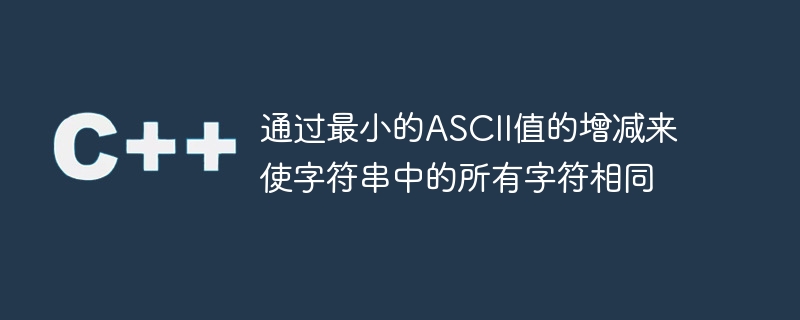Home >Backend Development >C++ >Make all characters in the string the same by increasing or decreasing the minimum ASCII value
Make all characters in the string the same by increasing or decreasing the minimum ASCII value
- 王林forward
- 2023-08-26 12:53:121471browse

The ASCII (American Standard Code for Information Interchange) system is often used in programming to manipulate characters. In this article, we will be examining an interesting problem where we need to make all characters of a string same by the minimum number of increments or decrements of ASCII values of characters. We will provide a detailed explanation of the problem, propose an efficient solution in C, and analyze its complexity.
Understanding Questions
Given a string consisting of lowercase English letters, our task is to make all characters in the string the same by changing their ASCII values. The catch is that we need to do this using the smallest number of changes.
We can operate by incrementing or decrementing the ASCII value of the character. Each increment or decrement counts as an operation. The goal is to find the minimum number of operations required to make all characters in a string the same.
method
To solve this problem, we need to find the character that appears most frequently in the string. The reason is that it would require fewer operations to change all other characters to this most common character.
First, we will count the frequency of each character in the string. Then we will find the characters with the highest frequency. The number of operations required to make all characters the same as this character will be the sum of the differences between the ASCII values of the most frequent characters and the ASCII values of all other characters.
C Solution
The Chinese translation ofExample
is:Example
The following is the C code to solve the problem -
#include<bits/stdc++.h>
using namespace std;
int minOperations(string str) {
int freq[26] = {0};
for (char c : str) {
freq[c - 'a']++;
}
int max_freq = *max_element(freq, freq+26);
int total_chars = str.length();
return total_chars - max_freq;
}
int main() {
string str;
cout << "Enter the string: ";
cin >> str;
cout << "Minimum operations: " << minOperations(str) << endl;
return 0;
}
Output
Enter the string: Minimum operations: 0
Code Explanation
Consider the string "abcdd". The character 'd' appears twice, more than any other character. Therefore, we should change all other characters to 'd'. The ASCII value of 'd' is 100. The ASCII values of 'a', 'b', and 'c' are 97, 98, and 99, respectively. So, the minimum number of operations will be (100-97) (100-98) (100-99) = 3 2 1 = 6. However, since we need to minimize the number of operations, we will instead decrement the ASCII values of 'a', 'b', and 'c'. In this case, the minimum number of operations will be (97 -97) (98-97) (99-97) = 0 1 2 = 3.
Conclusion
In this article, we saw how to solve unique problems involving ASCII value and string manipulation in C.
The above is the detailed content of Make all characters in the string the same by increasing or decreasing the minimum ASCII value. For more information, please follow other related articles on the PHP Chinese website!

